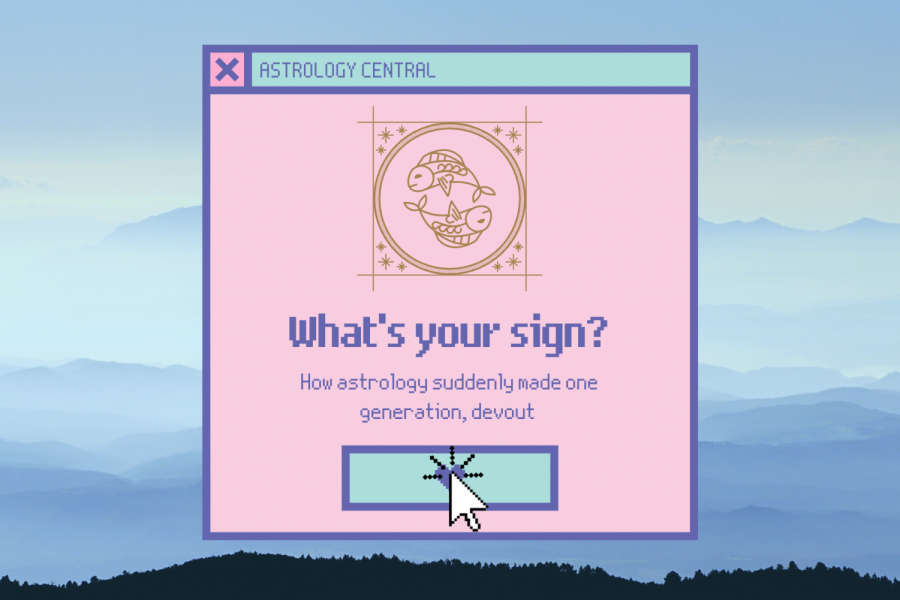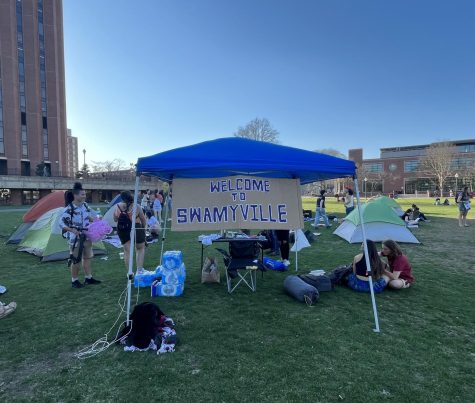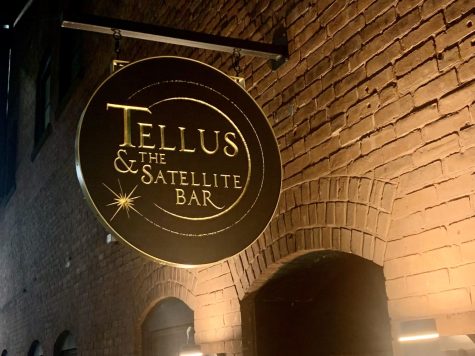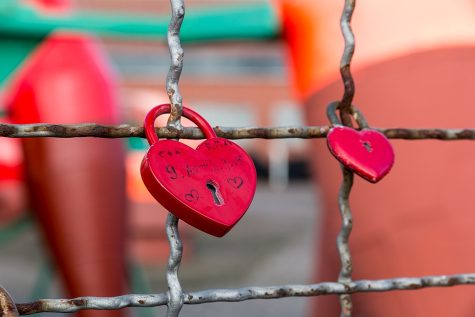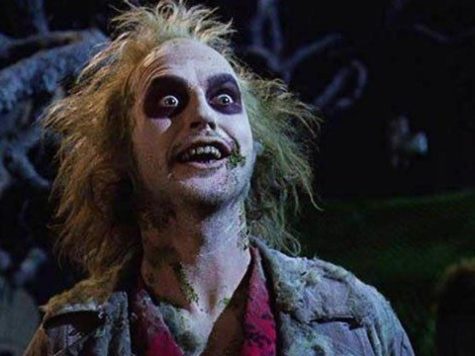From Catholic to Capricorn: Gen Zodiac’s obsession
How astrology has made the upcoming generation, devout
“Sleepless in Seattle” “You’ve Got Mail” and “When Harry Met Sally.” If it had Nora Ephron’s name and a VHS copy to match you could find it on the bookcase of my single aunt. In the 1990s these movies dominated the hearts and minds of single men and women everywhere. Maybe one day, you and Tom Hanks would find each other despite a long-distance connection. Surprisingly, a few years later you and Tom cosmically collide over an AOL chat room. Or perhaps Richard Gere would sweep you from prostituted poverty to prosperity.
“‘Moonstruck.’ ‘Moonstruck’ was so great. Why don’t you put on ‘Moonstruck?’” my mother would say after casting a shadow over various classic movies. When Cher, playing a deeply Italian woman, falls for the estranged brother of her fiancee under a luminous full moon, even the biggest cynic of the late 20th century swells with romantic fascination. There is something cosmic about the attraction that draws Nicolas Cage and Cher together.
Spectacular interactions line up and parallel themselves in these sorts of films. “When Harry Met Sally” presents a series of happenstances that simply must mean Billy Crystal’s Harry Burns and Meg Ryan’s Sally Albright are meant to be together. They share a car ride, decide they can’t be friends due to different ideologies. Five years later they find each other on the same flight, again unable to connect. Another five years pass and Sally’s single and Harry’s divorced, and slowly but surely they’re conjoined. The two attempts to fight their connection but a force from beyond seems to keep drawing them together.
Romantic comedies have not faded from the social consciousness. “(500) Days of Summer,” “Crazy Rich Asians,” and “The Big Sick” exemplify less perfection than their predecessors but display that same destiny drawing folks together or apart. There is that tether between destiny that has not eroded in cynicism.
Yet, as the upcoming generations of millenials and zoomers make their imprint on the world, there is a shift from the traditional. Altering love stories to questioning their religious roots, there is a path forward tied to an ancient tradition.
In the age of Aquarius, it seems David Bowie was wrong. Modern love does not get us to church on time but it does provide a guide to new spirituality: the astrological.
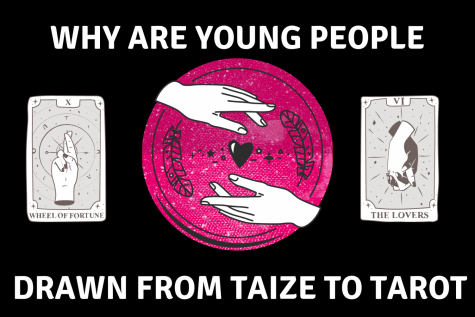
Anthony White is a 22-year-old studying acting at Salem State University. In the past year, White awoke to astrology. At a time of turmoil in their life, White struggled to find answers. Raised as an unbaptized Catholic, they found the organization “kind of culty” but attended regularly until age 16. They vowed to never step foot in a church again after their grandfather’s funeral in 2019. “Part of it has to do with my identity as a gay person… even just being black because 90% of the people in that church are Caucasian,” White said.
Through the rise of social media, White found themselves drawn to astrology. “Honestly while in the Catholic Church I really didn’t understand or feel much guidance,” White said.
They took a break from any type of religion. “I feel like especially during that break was when I was pretty lost and really confused and that’s kind of why I gravitated toward astrology because I saw it as like ‘Oh I’m reading this and it’s pretty accurate, this might be valid, this might be for me,’” White said.
White’s fading religious beliefs mirror a national trend among millenials and boomers alike. According to Christopher Bader, professor of sociology at Chapman University, a private university in Southern California, and author of “America’s Four Gods,” “the percentage of people who are drifting away from religion is growing quickly rapidly.”
According to Pew Research Center Poll from 2019, 40% of millennials, defined in their article as between 23 and 38, are affiliated with no religion. A similar poll from Pew Research center in 2017 revealed 29% of all U.S. adults believe in astrology. The correlation between these shifts relates to the cultural shift in social and political issues.
“Ethnographic research will say things like they don’t like the implicit connection between religion and politics they find in many churches,” Bader said. “They just don’t like the idea that their church might try to tell them how to feel about abortion or homosexuality.” According to a recent article by FiveThirtyEight’s Daniel Cox and Amelia Thomson-DeVeaux, “A majority (57 percent) of millennials agree that religious people are generally less tolerant of others, compared to only 37 percent of Baby Boomers.”
Religion has faded but a belief in God has not. Bader’s survey reveals 95% of Americans believe in one of four versions of the Judeo-Christian God; benevolent, authoritative, critical, or distant. Yet, where they find religion has transitioned.
“They can find religion on their own,” Bader said of millennials. “Amongst younger generations, there’s a far increased likelihood that if they were raised religious they’re going to leave it and that they’re not religious in the first place.”
Bader researches the social importance of paranormal activity groups, which encompasses astrological beliefs. He concludes that there is a significant structural difference between organized religion and the paranormal communities that exist for astrology, bigfoot, aliens and other belief center phenomena; democracy.
“Conventional churches are about top-down authority. The ultimate is obviously the Catholic Church where you’ve got the pope who is God’s emissary on Earth who literally gets to say ‘This is right and this is wrong’… You can’t just go into your church and believe whatever you want. You can do it silently. You can be simmering there in the back,” Bader said.
Paranormal groups do not operate with a centralized head. “In paranormal groups, they’re formed around people who have had the experience themselves. If you think of it in religious terms, they’ve all interacted with the God themselves,” Bader reflects. Organized religion has waned in favor of the more democratic individual-based “religion” of astrology.
However, like all things, astrology is far from perfect. When misused, it creates motivation for the day and for some it enables codependent relationships, delusions, and in some extended examples, fascism.
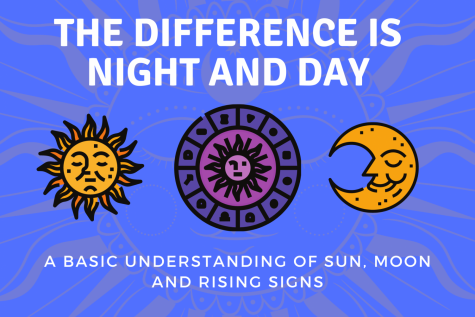
Before a deep dive into the ocean of astrological lingo, it’s important to define the main aspects of an astrological chart; sun, moon, and rising.
SUN
When asked, “What’s your sign,” most will immediately list their sun sign. This aligns with the time of year in which someone was born. Sagittarius, Capricorns, Aquarius, and Pisces find themselves born in the winter months while Geminis, Cancers, and Leos come to life during the summertime. Sun represents an outward personality.
MOON
According to cafe.astrology, a person’s moon sign dictates their “emotional responses, unconscious predestination, and the self-image.” This is you when you’re at your most comfortable. This who you might be when you’re alone and no one can see.
RISING
Rising, or ascendant refers to your worldview and how others perceive you. Allure.com says Leos are “extremely creative, whether you express yourself with a vlog, a gorgeous social media feed, or through creative outfits and makeup,” while Capricorns “strive for greatness, and you expect a lot of yourself and of others.” Most websites assign vague interpretations to each of these signs unless you go to the full-on natal chart. Some Tik Tok astrologers have made a correlation between outward appearance and this element.
NATAL CHART
The Natal Chart is an entire rundown of the positions of planets at the exact time and place of your birth. It predicts everything from romantic relationships (Venus), sexual inclinations (Mars), and darker deeper nature (Lilith, also the name of Adam’s first wife in Jewish Mysticism).
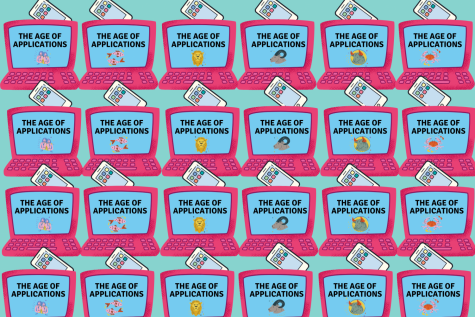
Using these terms and an understanding of astrology, Banu Guler founded Co-Star, an astrological app that uses daily notifications to give users their “Day At A Glance.” Anyone can sign up by simply inputting their birth date, time and location. Co-Star reported 6.5 million users in 2019. Julie Halpin handles their communication.
According to Halpin, a combination of human writers and artificial intelligence synthesize to create the app’s content. “Human writers and astrologers map snippets to astrological events for the AI to run with. AI then assembles content in real-time for each user. This is based on where the planets are now and where they were the moment you were born,” Halpin said.
Dr. Jennifer Freed is one of three astrological consultants for the Co-Star app. She serves as a consultant for Goop, Gwyneth Paltrow’s company, and independently reads natal charts for soul-searching clients. Despite her connection to Co-Star, Freed doesn’t see it as the only or best way to discover astrology. She disdains millennials “glomming onto instant answers from algorithms.”
“The reason I believe millennials are so into astrology is because they have been raised to expect fast, not deep answers to things… to not have any delay of gratification. Astrology used in the wrong way is an object of instant gratification,” Freed said.
Partially Freed blames the rise of social media for this instantaneous need. “The world as we know it, through digital expansion, has become more connected through information and data and more lonely than ever before for actual sensual human connection.”
Freed suggests digital disconnection has resulted in the search for knowledge and the rise in astrological interest.“Most people are numbed and dissociated to a degree because they’re constantly overwhelmed with data, not knowledge,” Freed said.
Freed focuses on client-centered astrology despite her connection to Co-Star. She believes while these apps are tools, human connection is the center of astrology.
“I think the problem right now with astrology blowing up the way it is, is like it’s like anything. It’s become commodified and put into a commercial sensibility that panders to people’s weaknesses and vulnerabilities and that’s an awful thing,” Freed said.
“I think like Co-Star and the Pattern are a part of this commercialization that you can’t really trust because at the end of the day… like I loved the Pattern,” Gill Wescott, a UMass Amherst psychology major, said.
“What’s the Pattern? Is that another app?” Fran Borghetti, a recent UMass Amherst women and gender studies alum, said.
The Pattern, popularized by Channing Tatum in July 2019, shares similarities to Co-Star. While Co-Star relies on daily charts, the Pattern uses year-long “world timing” categories based on zodiac placements to connect users.
“It’s frustrating to see that there’s makeup palettes and nail polish kits and Dolls Kill has a whole astrology thing. I mean so many websites are coming out with astrology lines all of a sudden. Well, five years ago you definitely wouldn’t have done that,” Westcott said.
However, five years ago, evidence of brands leveraging astrology in their marketing strategy. Trend Hunter, a website that identifies consumer data trends, has an article from 2013 noting astrological based products. However, the uptick in companies cashing in on this type of spirituality comes into prominence around 2016 with then-cultural phenomenon Buzzfeed listing “32 Zodiac Gifts That’ll Leave You Star Struck.”
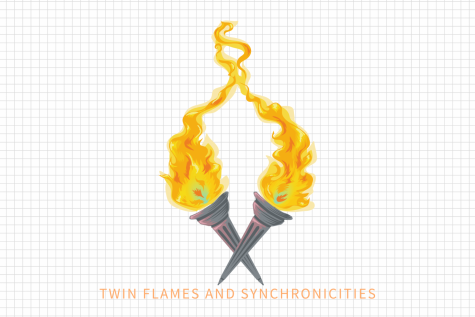
For Borghetti and Westcott, their interest in astrology stems from what they call “oneness,” something that mirrors the oneness they feel in their friendship. An Aquarius themselves, Westcott was drawn toward Geminis, two signs that they claim have “been known since ancient times for just getting along and having this sort of intellectual dynamic that works because of their natures.”
In fourth grade, Borghetti and Westcott began their connection but struggled to understand their draw to one another. “Fran and I actually have known each other our whole lives and for a while, I was like ‘That actually doesn’t make sense because Fran’s a Capricorn and I don’t really get why we were so close.’” Westcott said.
Then it clicked.
“Lo and below, Fran has a Gemini moon,” Westcott continued. “This is just something that transcends my understanding of astrology… all of my exes have significant Gemini placements. How do you prove these people have similar qualities?”
After a falling out, Westcott and Borghetti actively avoided each other for three years. The two never spoke, blocked each other on all types of social media, and would walk the other way when they saw each other on campus. This fracture was a trend in Westcott’s relationships with Geminis but they continued to think of each other.
In Westcott’s final semester, they sat in their Consciousness class when Borghetti walked in after three years of radio silence. “This is like an opportunity and you had been coming up in my mind a lot,” Borghetti said.
The pair allowed their connection to revitalize and thank astrology and collective consciousness for their reunion. “‘As above so below,’ that’s what astrologers believe. So that is to say that the solar system is a reflection of the collective consciousness,” Westcott said.
“The chart is kind of like a description of what was going on in the solar system at the moment you were born in relation to where you were born,” Westcott said.
Borghetti explains in-depth, “You are expressing that energy signature that was present when you came into being, when you embodied this body, the way things are is…” Westcott finishes her sentence, “a reflection, you’re a reflection of it.”
Wescott’s discovery of their Pisces moon gave them more guidance over their life. “People describe Pisces moons as being very vulnerably emotional people. They say we have no skin almost, like no protection. We’re very thin-skinned, emotional, we have a lot of malleability,” Westcott said.
“These were things I found so much validation in reading about myself because these were ways I never thought to own as a part of me even though I feel like my life has become easier because I’ll tell people, yes, I am a very emotional person, whereas when I was younger, I would struggle against it. It was almost an invisible part of me,” Westcott said.
White echoes these sentiments in his own self-discovery. “I’m a Cap[ricorn] moon so Capricorn moons tend to repress their emotions in the name of duty and in the name of work and being productive. It’s taught me I need to deal with things in the moment as opposed to pushing it off because it all bubbles up and comes off worse,” White said.
For all three, White, Borghetti and Westcott, astrology illustrates a piece of a large puzzle: the search for meaning. “When you hear multiple people saying the same thing, it makes it easier to believe and that’s the thing with astrology,” Borghetti said.
White recently ended a relationship with a man named Michael. They found signs everywhere as their relationship began. The day after their relationship started they walked into their local psychic parlor, Omen in downtown Salem, Mass. (yes that Salem) and chanced upon a reading. “There was a man behind a curtain giving this woman some kind of reading. I step my foot in the door and he’s talking to this woman. They’re both behind a curtain and he goes, “You should look out for someone in your life with an M, they’re very important’ and he was like ‘A Mike? A Michael?’” White was shocked. “Immediately I was like that wasn’t for her. That was for me and I was meant to hear that,” he said.
They describe this sort of sign as synchronicity and their connection to their former partner as a twin flame.
Synchronicities, as defined by Gregg Lenvoy of PsychologyToday, are “events connected to one another, not by strict cause-and-effect.” For the astrologically invested, the word “coincidence,” does not exist.
Borghetti notes a significant series of synchronicities that lead her to deepened spirituality. “For instance the book, “The Celestine Prophecy.” I was reading that book this summer when I was in Australia. It really explains all the different insights that humans need to grasp in order to ascend to evolve human consciousness.” Borghetti said.
Australia marked significance in Borghetti’s life. Across bus rides, train rides and sailing trips, Borghetti was captivated by the book. By chance, Borghetti kept interacting with complete strangers who had great familiarity with the book. During her time in Australia, Borghetti spent several weeks in a communal living hostel. After a life-changing sailing trip, Borghetti sat down to dinner. Moments later a man sat down to chat with her. She had seen him before but they had never spoken.
“Immediately he’s like ‘Have you read “The Celestine Prophecy?”’ Borghetti said. She reached into her bag and revealed she finished it the night before. She was amazed at the coincidence.
“Meeting him in that moment was definitely a synchronicity,” Borghetti said.
Many people cite instances like these when choosing the “right” path. In White’s case, these signs were leading him to their twin flame.
Despite the intensity of their connection, White understood in order for the pair to grow, they must exist separately. He is assured “their souls will dance forever in eternity,” as is integral to the twin flame relationship, that the connection will repeat across various incarnations and lifetimes.
According to Allure, a twin flame, while not necessarily a romantic connection, is an individual who enforces a “divine, shift consciousness, and becomes a better, soulful being in this experience.”
By what if, unlike White, Borghetti and Westcott, one takes astrology verbatim. When people take what they believe to be the word of God into their own hands, danger ensues. What about astrology? When and how can intense devotions to astrology cross the line?
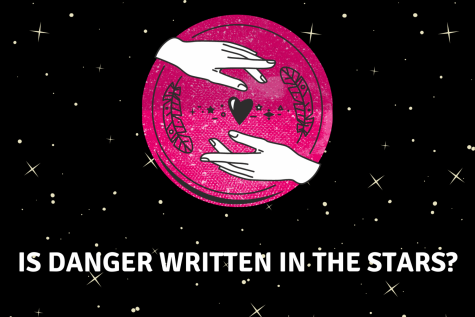
Lana Polansky is a freelance journalist and has been published in the Wall Street Journal. On Nov. 3rd 2019, Polansky tweeted, “to kick a hornet’s nest: astrology is a gateway to fascism. all such mysticism that seeks to explain human behavior as inborn and predetermined rather than as a result of material conditions is like this. it is not “misogyny” to point this out. yes, whatever men like is bad too.”
Her tweet received thousands of replies in dissent. She criticizes the lack of self-awareness in astrology and her belief it connects to fascism. Astrology relies on a predetermined idea based on your birthday, time, and various other factors that you will be a certain way.
“Race science, for example, is just as irrational as astrology is, if far more openly evil, but similarly relies on the systematization of bunk information about categories of people in order to cloak itself in legitimacy,” Polansky said.
Polansky lists several right and far-right individuals who have subscribed to astrology; the Nazi Party’s fascination with Guido von List, Jair Bolsonaro, Juan Guaido, Narendra Modi, and the 40th president of the United States, Ronald Reagan. After his assassination attempt, Nancy Reagan brought in Joan Quigley, a prominent astrologer, to consult the president. Allegedly this led to Chief of Staff Donald Regan resigning.
“You don’t need to be a literal fascist in order to inadvertently enable and normalize protofascist ideas,” Polansky said. Yet Polansky remains wary of the popularized practice.
Whether it’s matters of life, death, or love, Freed does not dispute Polanksy’s claims. Instead, she suggests astrology is a tool, not a solution as the leaders above might believe. “Make that very clear, astrology is a tool, not a solution,” Freed said.
She warns young people about the practice, “New people to anything are easily impressionable and can get lost by giving up their power to an outside authority.”
“I think anybody of knowledge can be misused and misappropriated in the hands of evil. Just like the atomic bomb, just like anything,” Freed said.
Email Julia at [email protected] or follow her on Twitter @juliadonohue3

